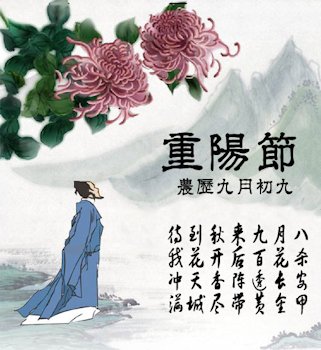
|
Chinese Chong Yang Festival (Double Ninth Festival)
Chong Yang Jie is also known as "Chung Gau" (Chong means Double and Gau means nine). Being the ninth day of the ninth month, it is the Double Nine, also means forever and is the day on which Chinese people go to the hillsides to tend their ancestor's graves, make sacrifices of special paper money and paper winter clothing, after which a picnic is held. It also commemorates the day during the Han Dynasty (B.C. 221 - 206) when a Taoist soothsays, Fei Chang-fei advised a scholar, Huan Jing, to escape to the hills with his family to avoid an impending disaster. Huan Jing took the advice and went to the hillside with his family, taking food and chrysanthemum wine. When returned home all his livestock dead from a plague and realized the soothsayer had saved the lives of himself and his family. Children in many provinces fly kites on this day. Since the weather during this time of year is excellent for kite flying, many families go to the countryside to take advantage of it. The kites are usually in the shape of animals such as centipedes, eagles, and butterflies among others. The saying that "the wind blows and the kites bite" refers to kite-flyers attempting to cut one another's strings with their own. This horseplay is all done in the spirit of fun and when a kite falls the gathering will cheer. Return to Chinese Holiday Choices On to Lunar New Year Holiday ⇨ |
| A Day for Kite Flying |